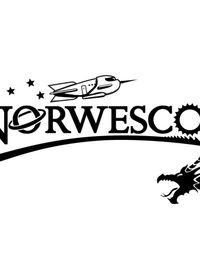Complete 2024 Hugo Voting
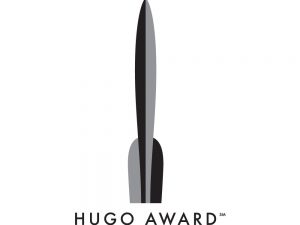 Glasgow 2024, the 82nd World Science Fiction Convention, received 3,436 valid ballots (3,431 electronic, five paper), up from 1,674 at Chengdu Worldcon. There were an additional 377 ballots disqualified as fraudulent or ‘‘not cast by natural persons.’’ There were 1,720 nominating ballots (1,715 electronic, five paper), down from 1,847.
Glasgow 2024, the 82nd World Science Fiction Convention, received 3,436 valid ballots (3,431 electronic, five paper), up from 1,674 at Chengdu Worldcon. There were an additional 377 ballots disqualified as fraudulent or ‘‘not cast by natural persons.’’ There were 1,720 nominating ballots (1,715 electronic, five paper), down from 1,847.
The procedure for counting nominations remains the E Pluribus Hugo, or EPH, system. The rather complicated system gives a single point to each voter’s ballot, dividing that point among the nominees. The points are counted, the two nominees with the fewest points are compared, and (points notwithstanding) the one with the fewest nominations (votes) is dropped. The process repeats until down to six finalists; the last position on the ballot is determined strictly by votes unless there’s a tie. This system complicates discussing how close a runner-up was to making the ballot, as some nominees might have eliminated others earlier on if they’d had just a few more points. We used to try to determine how far back the closest runner-up to the ballot was, but the last few years the official nomination statistics have included their own determination of the margin by which the last place on the final ballot was decided, and we’re using those summations. In some cases they specify the number of ‘‘bullet votes’’ – nominating votes on ballots with only one nominee in the category – the closest runner-up needed to make the ballot.
Once again, it’s time to explain the Australian ballot preference system (also called ranked voting or ‘‘Instant Runoff Voting’’) used for the Hugo Awards. First-place votes (including those for No Award) are counted in column one. If no entry has the majority of the vote then the entry with the fewest votes is dropped (e). The dropped entry’s second-place votes now become first-place votes (column two) and the process is repeated until a nominee has a majority of the votes (usually six drops, with six finalists), deciding first place. Second place is determined by dropping the winner, counting their second-place votes as if they were first, etc. Therefore, the item that originally placed second doesn’t necessarily win second place. Likewise, third place is decided by dropping both first- and second-place winners, promoting the next eligible entry, and counting all over again. The system ensures that the winner is liked by a majority of voters, even though it may not have received a majority of first-place votes.
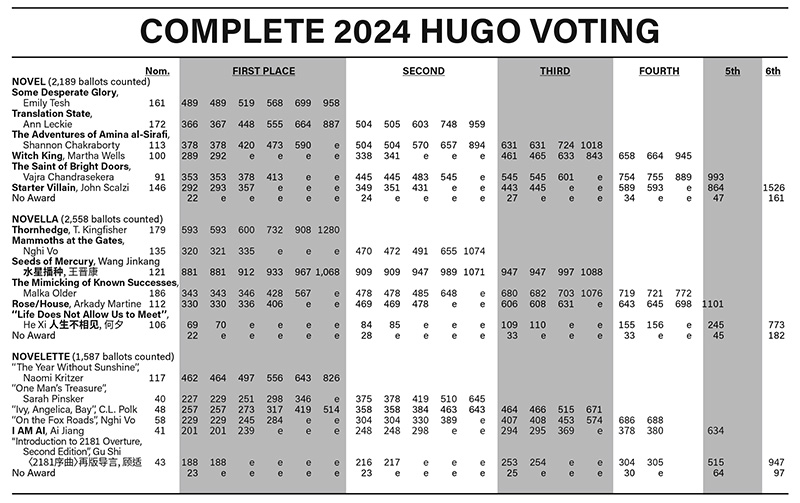
BEST NOVEL
Some Desperate Glory by Emily Tesh won without a serious challenge, leading the voting all the way through six rounds. Translation State by Ann Leckie, which the most nominations, still had a bit of a contest to take second, tied in the first round with The Adventures of Amina al-Sirafi by Shannon Chakraborty, pulling ahead by just one vote in the second round, but increased that lead through the remaining rounds to take second. The Chakraborty led all the way in four rounds of voting for third place. The Saint of Bright Doors by Vajra Chandrasekera led the first two rounds of voting for fourth place, but when John Scalzi’s Starter Villain dropped, the bulk of its next-place votes went to Witch King by Martha Wells, giving it fourth. The Chandrasekera then took fifth in a single round, and the Scalzi took sixth. The closest runner-up to the ballot was The Terraformers by Annalee Newitz, which needed three more votes to make the ballot. Martha Wells declined nomination for System Collapse; Cosmo Wings by Jiang Bo also would have made the ballot but was declared ineligible due to 2024 publication. This was Tesh’s first Hugo nomination and win.
BEST NOVELLA
This was a real contest.Wang Jinkang’s Seeds of Mercury started with a big lead in the first round of voting and held onto the lead through the next four rounds, only to see T. Kingfisher’s Thornhedge jump into the lead to win the Hugo in the sixth round; Seeds of Mercury then led the first four rounds of voting for second place, only to lose to Nghi Vo’s Mammoths at the Gate the fifth round; Seeds of Mercury then took third place without serious challenge. (This was something of a trend for a number of titles from China; since last year’s Worldcon in Chengdu increased interest and made a lot of Chinese members eligible to nominate for the Hugos, some Chinese titles got quite a number of nominations and first-place votes, but tended not to pick up many additional votes as English-language titles dropped in subsequent rounds.) Malka Older’s The Mimicking of Known Successes took fourth place. Arkady Martine’s Rose/House won fifth place in a single round, leaving He Xi’s ‘‘Life Does Not Allow Us to Meet’’ in sixth. The closest runner-up to the ballot was Fonda Lee’s Untethered Sky, 12 votes away from the ballot. This was Kingfisher’s sixth Hugo Award nomination, and her third win under this pen name; she has an additional two wins as Ursula Vernon.
BEST NOVELETTE
‘‘The Year Without Sunshine’’ by Naomi Kritzer won without serious challenge, starting with the most nominations and first-place votes, and led all the way through six rounds of voting. ‘‘One Man’s Treasure’’ by Sarah Pinsker then maintained a modest lead through five rounds to take second place, ‘‘Ivy, Angelica, Bay’’ by C.L. Polk took third in similar fashion. ‘‘On the Fox Roads’’ by Nghi Vo took fourth place in just two rounds, I AM AI by Ai Jiang took fifth in just one, and ‘‘Introduction to 2181 Overture, Second Edition’’ by Gu Shi ended up in sixth. Of the nominees, author Hai Ja declined nomination for ‘‘The Far North’’, which had topped the list. The closest runner-up to the ballot was ‘‘Science Facts!’’ by Sarah Pinsker, which needed either eight more votes or over 4.00 points to make the ballot. Kritzer has two nominee/winners on this year’s ballot, giving her a total of six Hugo Award nominations and three wins.
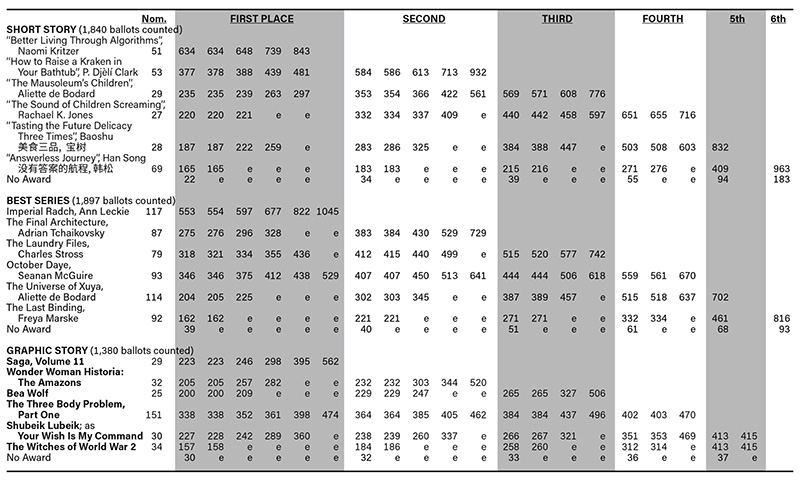
BEST SHORT STORY
Naomi Kritzer’s ‘‘Better Living Through Algorithms’’ won easily, starting with a big lead in first-place votes, and winning in just five rounds. Second place went to P. Djèlí Clark’s ‘‘How to Raise a Kraken in Your Bathtub’’, which started the second-place voting with a solid lead and held on to take second in five rounds. Aliette de Bodard’s ‘‘The Mausoleum’s Children’’ took third place without challenge, and Rachael K. Jones’s ‘‘The Sound of Children Screaming’’ took fourth in similar fashion. Baoshu’s ‘‘Tasting the Future Delicacy Three Times’’ took fifth place in a single round, and ‘‘Answerless Journey’’ by Han Song followed in sixth. The closest runner-up, Isabel J. Kim’s ‘‘Day Ten Thousand’’, would have needed two more votes to make the ballot. As noted under novelette, Kritzer now has six Hugo Award nominations and three wins.
BEST SERIES
Ann Leckie’s Imperial Radch series won easily, coming in with the most nominations, a good lead in first-place voters in the first round, and won in the sixth round with almost twice the votes of the closest competitor, Seanan McGuire’s October Daye series. The battle for second place started with Charles Stross’s The Laundry Files leading in the first round, followed by the October Daye series and Adrian Tchaikovsky’s The Final Architecture series. They held their placed in the second round, but then Freya Marske’s The Last Binding series dropped and the McGuire jumped into the lead in the third round, only to have The Final Architecture to take the lead in the fourth round, holding on to take second in the fifth round. The Laundry Files then took third place without challenge and October Daye took fourth in similar fashion, Aliette de Bodard’s The Universe of Xuya took fifth in a single round, and The Last Binding took sixth. The closest runner-up was Max Gladstone’s The Craft Sequence series, which needed 18 more votes to make the ballot. This is Leckie’s sixth Hugo Award nomination and second win.
BEST GRAPHIC STORY
Saga, Volume 11 Brian K. Vaughan & Fiona Staples (artist) won after fending off a major challenge from The Three-Body Problem, Part One by Cixin Liu, et al., which started with the most nominations and the most first-place votes in the first round, and kept the lead through the fifth round, only to lose to Saga, Volume 11 in the sixth round. The Three-Body Problem again led the voting for second place, but after holding the lead through four rounds, it lost to Wonder Woman Historia: The Amazons by Kelly Sue DeConnick & Phil Jimenez (artist) when it jumped ahead in the fifth round and take second. The pattern continued in third place, with The Three-Body Problem leading for three rounds, only to see Bea Wolf by Zach Weinersmith & Boulet (artist) take third in the fourth round. The Three-Body Problem finally took fourth place in three rounds. Shubeik Lubeik (in the UK as Your Wish Is My Command) by Deena Mohamed and Witches of World War 2 by Paul Cornell & Valeria Burzo (artist) then tied for fifth place. The closest runner-up to the ballot was Why Don’t You Love Me? by Paul B. Rainey, which would have needed nine more votes to get on the ballot. This was Brian K. Vaughan’s 12th Hugo nomination, Fiona Staples’s eighth nomination, and the first win for both.
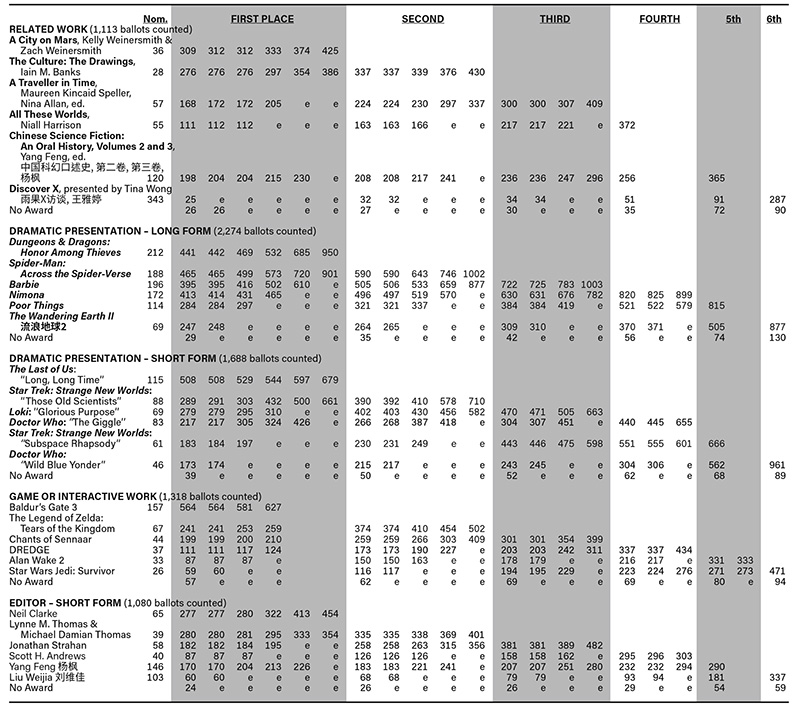
BEST RELATED WORK
A City on Mars by Kelly Weinersmith & Zach Weinersmith snagged the Hugo in six rounds with no real competition. Similarly, The Culture: The Drawings by Iain M. Banks snagged second place in five rounds; and A Traveller in Time: The Critical Practice of Maureen Kincaid Speller by Maureen Kincaid Speller, edited by Nina Allan, took third place in four rounds. The last three places all went in single rounds of voting: All These Worlds by Niall Harrison snagged fourth, Chinese Science Fiction: An Oral History, Volumes 2 and 3 edited by Yang Feng came fifth, and Discover X by Tina Wong (which had by far the most nominations) was sixth. The closest runner-up to the ballot was Making It So by Patrick Stewart, just one vote away from making the ballot. ‘‘This Is How You Lose the Time War promotional tweets’’ by Bigolas Dickolas Wolfwood would have made the ballot, but the author declined nomination. This is the first Hugo Award for both winners; Kelly Weinersmith has one Hugo nomination and Zach Weinersmith has two, one from this year under ‘‘Best Graphic Story or Comic’.’
BEST DRAMATIC PRESENTATION – LONG FORM
Spider-Man: Across the Spider-Verse started out with the most first-place votes, staying ahead of Dungeons & Dragons: Honor Among Thieves (which had the most nominations) for and the first five rounds, but once Barbie dropped, the bulk of its votes went to Dungeons & Dragons: Honor Among Thieves, giving it the Hugo. The rest of the places went without notable challenge: Spider-Man: Across the Spider-Verse took second place, Barbie followed in third, Nimona fourth, Poor Things fifth, and The Wandering Earth II sixth. The closest runner-up was Godzilla Minus One, just one vote from making the ballot.
BEST DRAMATIC PRESENTATION – SHORT FORM
The Last of Us: ‘‘Long, Long Time’’ won easily, leading in both nominations and first-place votes and leading through all six rounds. Second place was more of a contest, with Loki: ‘‘Glorious Purpose’’ leading the first three rounds, only to see Star Trek: Strange New Worlds: ‘‘Those Old Scientists’’ pick up enough votes to take a decisive lead after another Star Trek: Strange New Worlds episode, ‘‘Subspace Rhapsody’’, dropped. Loki: ‘‘Glorious Purpose’’ then took third without challenge. Star Trek: Strange New Worlds: ‘‘Subspace Rhapsody’’ led in the first two rounds of voting for fourth, but then Doctor Who: ‘‘The Giggle’’ took fourth after Doctor Who : ‘‘Wild Blue Yonder’’ dropped. ‘‘Subspace Rhapsody’’ then took fifth in a single round, and ‘‘Wild Blue Yonder’’ took sixth. Doctor Who: ‘‘The Church on Ruby Road’’ was the closest runner-up, needing 8.8 more points to qualify for the ballot.
BEST GAME or INTERACTIVE WORK
Baldur’s Gate 3 came in with by far the most nominations and first-place votes, and won the Hugo Award in just four rounds. Zelda: Tears of the Kingdom took second place without challege, followed in similar fashion by Chants of Sennaar in third, DREDGE in fourth, Alan Wake 2 in fifth, and Jedi: Survivor in sixth. The closest runner-up, Stray Gods, needed an additional six bullet voters to make the ballot. This is a new category for the Hugos; a previous one-off (as Best Video Game) was awarded in 2021.
BEST EDITOR – SHORT FORM
Neil Clarke won, but only after a definite contest. The first three rounds saw Lynne M. Thomas & Michael Damian Thomas in the lead, just three votes ahead of Clarke in the first two rounds, and one point ahead in the third; Clarke took the lead in the fourth round, and went on to win in the sixth. Lynne M. Thomas & Michael Damian Thomas then took second, followed by Jonathan Strahan in third place, Scott H. Andrews in fourth, Yang Feng (who had the most nominations) in fifth, and Liu Weijia in sixth. Nisi Shawl, the closest runner-up to the ballot, would have needed 3.34 more votes to make the ballot. This is Clarke’s 16th Hugo Award nomination and sixth win overall, and his 12th nomination and third win in this category.
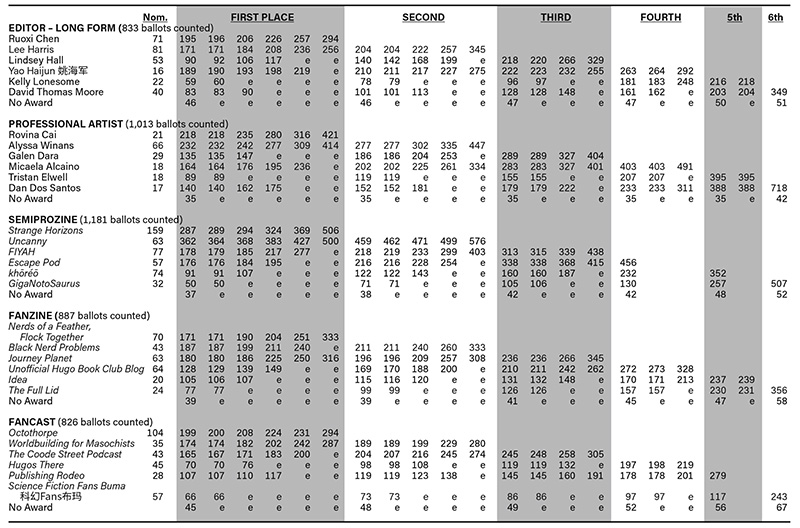
EDITOR – LONG FORM
Ruoxi Chen started with a slim lead in first-place votes, but managed to hold onto the lead through six rounds to win. Voting for second place started with Yao Haijun in the lead for the first two rounds, but in the third round Lee Harris moved into the lead and stayed there, taking second in the fifth round. Yao Haijun again led in the first two rounds of voting for third place, only to see Lindsey Hall move ahead in the third round, taking third place in the fourth round. Yao Haijun took fourth place without challenge in three rounds, Kelly Lonesome followed in fifth place, and D.T. Moore ended up in fifth. Natasha Bardon declined nomination. The closest runner-up to the ballot was Gillian Redfearn, who needed five more votes worth at least 2.86 points to make the ballot. This was Chen’s third nomination and second win.
BEST PROFESSIONAL ARTIST
Rovina Cai won, but it was a tight contest with Alyssa Winans, who had the most nominations and the most first-place votes. Winans held onto the lead through the first three rounds, but Cai pulled ahead by three votes in the fourth round, and held on to win. Winans then took second place unchallened. Galen Dara took third place, fending off a challenge from Micaela Alcaino who briefly tied in the third round; Alcaino then took fourth place; Tristan Elwell took fifth; and Daniel Dos Santos followed in fifth. Feifeu Ruan missed making the ballot by two votes worth at least 1.08 points. This was Cai’s fourth nomination and third win.
BEST SEMIPROZINE
Strange Horizons took the Hugo in a tight contest, winning by just six votes, the smallest margin this year. Uncanny led the voting with substantial leads in all first five rounds, but when FIYAH dropped Strange Horizons picked up enough votes in the sixth round to win. Uncanny then led all the way in voting for second place, taking it in five rounds. Third place was another skirmish, with Escape Pod leading the first three rounds, only to have FIYAH jump ahead and take third place in the fourth round. The next three places were all settled in a single round: Escape Pod took fourth place, khōréō took fifth, and GigaNotoSaurus took sixth. The closest runner-up was Interzone, which needed two more votes to qualify for the ballot. This is the first win for Strange Horizons; nominations are difficult to count, as they have been listed under different editor names or as a collective, but we count around 12 nominations on the official Hugo Awards site.
BEST FANZINE
Nerds of a Feather, Flock Together won, but it wasn’t an easy victory, even in nominations; despite starting with the most nominations, it was second in points to Journey Planet. In the voting, Black Nerd Problems led through the first three rounds, Journey Planet then took the lead briefly in the fourth, and finally Nerds of a Feather managed to take a one-point lead in the fifth round and won in the sixth. Black Nerd Problems then led through all five rounds to take second place, Journey Planet took third place in four rounds. Unofficial Hugo Book Club Blog followed in fourth, Idea in fifth, and The Full Lid in sixth. The closest runner-up to the ballot was Zero Gravity News, half a point away from the ballot. This was the seventh nomination and second win for Nerds of a Feather, Flock Together.
BEST FANCAST
Octothorpe won with only a slight challenge; it started with the most nominations and then led the first four rounds of voting, and then after Publishing Rodeo dropped, Worldbuilding for Masochists briefly grabbed the lead in the fifth, but Octothorpe picked up enough of the votes when The Coode Street Podcast dropped to reclaim the lead and win in the sixth round. The voting for second place saw The Coode Street Podcast in the lead until Publishing Rodeo dropped and once again Worldbuilding for Masochists got a surge, taking second place in the fifth round. The Coode Street Podcast then took third place without a contest, followed by Hugos There in fourth. Publishing Rodeo snagged fifth place in one round, followed by Science Fiction Fans Buma in sixth. Two fancasts originally making the ballot were determined to be professional publications and not eligible. The closest runner-up was Hugo, Girl!, which needed 8.33 more points to qualify for the ballot. This was the third Hugo Award nomination and first win for Octothorpe.

BEST FAN WRITER
Paul Weimer had the most nominations, the most first-place votes, and led all the way to win in six rounds. Jason Sanford then took second place in five rounds without challenge. Bitter Karella led through four rounds to take third, followed by Alasdair Stuart in fourth. James Davis Nicol snagged fifth place in a single round, and Örjan Westin ended up in sixth. Camestros Felapton declined nomination; the closest runner-up to the ballot was Alex Brown, who need three more votes worth 1.75 points to make the ballot. This was Weimer’s first Hugo Award win and fourth nomination in this category, but counting his work in other categories (including as an editor of this year’s winning fanzine Nerds of a Feather, Flock Together) he has a total of nine nominations and two wins.
BEST FAN ARTIST
Laya Rose took the Hugo Award without contest, leading all the way through six rounds. Iain J. Clark, who had the most nominations, then took second place in similar fashion, followed by Sara Felix in third, and Dante Luiz in fourth. Alison Scott took fifth in a single round, leaving España Sheriff to take sixth. The closest nominee was Yuumei, a slim 0.8 votes back of the ballot. This was Laya Rose’s third Hugo nomination and first win.
LODESTAR AWARD FOR BEST YOUNG ADULT BOOK (NOT A HUGO)
To Shape a Dragon’s Breath by Moniquill Blackgoose started with the most nominations and the most first-place votes, and never lost the lead, taking the award in six rounds. Liberty’s Daughter by Naomi Kritzer took second place with similar ease, followed by The Sinister Booksellers of Bath by Garth Nix in third, and Unraveller by Frances Hardinge in fourth. Abeni’s Song by P. Djèlí Clark took fifth place in just one round, and Promises Stronger than Darkness by Charlie Jane Anders ended up in sixth. Camp Damascus by Chuck Tingle was the closest runner-up; it would have needed another ten votes worth 6.05 points to make the ballot. This was the first Lodestar nomination and win for Blackgoose, who was also nominated for the other Not-a-Hugo award on the ballot this year, the Astounding Award for Best New Writer.
ASTOUNDING AWARD FOR BEST NEW WRITER (NOT A HUGO)
Xiran Jay Zhao took the Astounding Award without challenge in six rounds. Moniquill Blackgoose led all the way in the voting to take second place in five rounds. Third saw a rare tie: Ai Jiang started out with a solid lead in the voting, but in the fourth and final round Sunyi Dean (who had the most nominations) surged forward to tie the vote. Hannah Kaner then took fifth place in just two rounds, and Em X. Liu took sixth. This was Zhao’s second year of eligibility, extended by request of the award’s sponsor Dell Magazines; they had been dropped from the ballot last year as ineligible in that year’s controversial nominating process.
– Carolyn Cushman
This report and more like it in the September 2024 issue of Locus.
 While you are here, please take a moment to support Locus with a one-time or recurring donation. We rely on reader donations to keep the magazine and site going, and would like to keep the site paywall free, but WE NEED YOUR FINANCIAL SUPPORT to continue quality coverage of the science fiction and fantasy field.
While you are here, please take a moment to support Locus with a one-time or recurring donation. We rely on reader donations to keep the magazine and site going, and would like to keep the site paywall free, but WE NEED YOUR FINANCIAL SUPPORT to continue quality coverage of the science fiction and fantasy field.
©Locus Magazine. Copyrighted material may not be republished without permission of LSFF.




